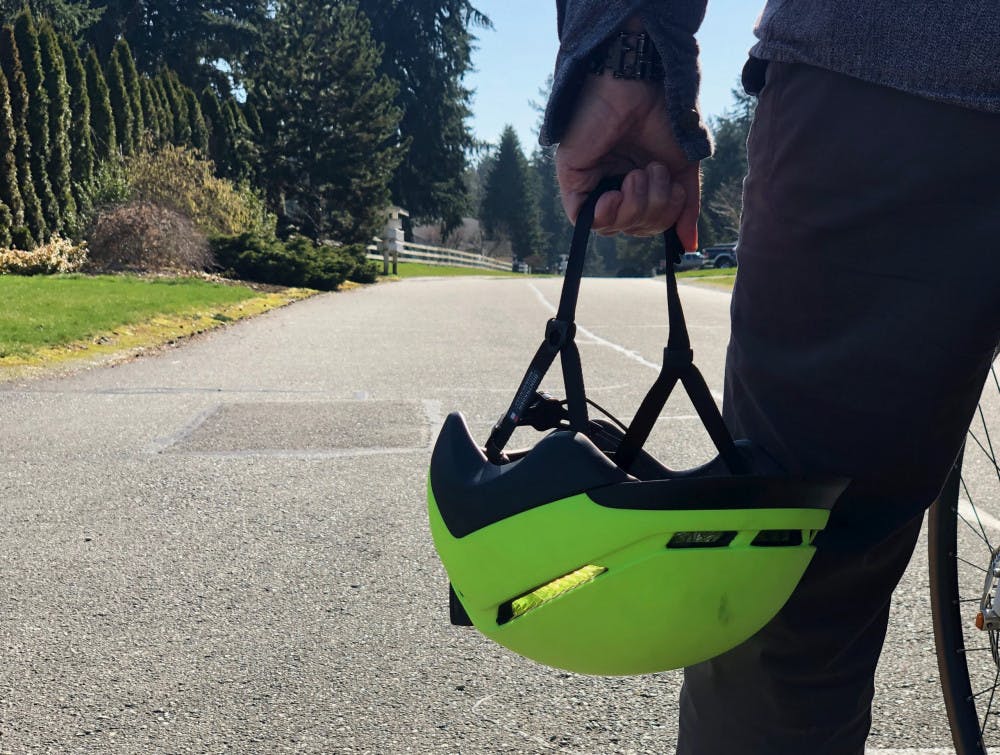Helmet criminalization found to be inequitable, Bellingham sees advantages to no law

Twenty-six cities and counties in Washington state have a helmet law for bicyclists.
Whatcom County is not one of them.
The gold-level bicycle community does not plan on changing that anytime soon, said Chris Comeau, the transportation planner for Bellingham Public Works.
Comeau said they believe helmets reduce the risk of suffering a head injury but finds issue in the implications of a county-wide law requiring helmets.
“Requiring the wearing of a bicycle helmet actually creates a barrier to entry for some of these people, in that, they simply may not be able to afford a bicycle helmet and therefore could be penalized and get a ticket for riding a bike without a helmet,” Comeau said. “And that's a social equity issue.”
Kirsten Wert, a Smart Trips program coordinator, said teaching Bellingham cyclists to be predictable and confident in their riding skills is key.
“There's lots of things that you can do to make riding safe for yourself, just with the way you ride your bike,” Wert said. “That is way more important to me than, you know, whether people have to wear a helmet or not.”
Wert said a helmet requirement prevents people from wanting to use their bikes as a means of transportation.
“Making laws that require one more piece of gear can keep people from biking,” Wert said. “My goal was to get more bikes on the road because that'll make things safer for everyone.”
Not all counties operate under this policy. Neighboring King County enforces helmet laws and data indicates it may not be an equitable practice.
According to a 2021 study by E.C.C for Central Seattle Greenways, there were racial disparities in the citation of bicycle infractions issued by the police.
The data, which was collected from 2003-20, showed Black cyclists cited for helmet infractions at a rate 3.8 times higher than white cyclists. Additionally, 17.3% of Black riders received infractions despite only representing 4.7% of all Seattle cycling trips recorded, according to the study.
Cascade Bicycling Club and Washington Bikes are working to repeal the helmet law in King County, first made effective in 1993 and expanded to include Seattle in 2003, according to the Washington Department of Transportation.
Paul Tolmé, the content strategy and media relations manager for Cascade Bicycle Club, said the two organizations are working to repeal the law because they believe safety infrastructure will promote safety and required helmets create disproportionate enforcement.
“[Cascade Bicycle Club] encourages everybody who owns a helmet and who can afford a helmet to wear one when riding a bike, but we do not believe it should be a criminal law enforcement matter,” Tolmé said.
Tolmé said instead of enforcing helmets in King County, safety infrastructure like reducing vehicle speeds and creating protected cycling spaces is the best way to encourage people to ride while keeping them safe.
Tamar Shuhendler, a Cascade Bicycle Club and Washington Bikes community organizer, said the organizations are focusing on working directly with the community to create a more equitable system.
“I think that communities most impacted, or communities on the ground, have to say takes complete precedent,” Shuhendler said. “We'll take our cues from what those folks want to see happen next.”
Washington state Rep. Sharon Shewmake, a representative for Whatcom County and local cyclist, said helmet laws are generally not viewed as good policies because they discourage people from riding bikes.
“One of the things that keeps individuals safer when they're riding bikes is that when there are more people riding bikes, and so it's that safety in numbers, we want to encourage that,” Shewmake said.
Shewmake said she feels comfortable riding her bike in Bellingham, but many congestion points and risks in the downtown area are a problem.
Shewmake said overall the lack of a helmet law doesn’t make biking dangerous in Bellingham but rather the focus needs to be on creating more transportation infrastructure.
Sophia Struna is the city news editor for The Front and a third-year news/editorial journalism major. Her work focuses on city features, ranging from important issues impacting Bellingham to light-hearted community interactions. When not reporting, Sophia loves catching the sunset or spending time with her dog. You can contact her at sophiastruna.westernfront@gmail.com.





